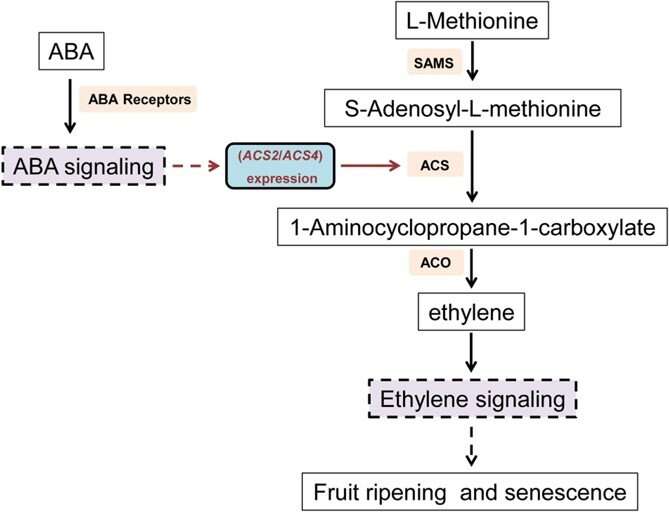Revealing the interactions between ABA and ethylene signaling during tomato fruit ripening

Recently, scientists from Chongqing University provided new insights into the complex regulatory network of phytohormones that regulate fruit ripening in tomato. They introduced multi-gene interference (RNAi) vectors to silence the expression of target ABA receptors and screen for receptors that mediate ABA signaling during the regulation of fruit ripening. SlRCAR9, SlRCAR12, SlRCAR11, and SlRCAR13 were identified as crucial ABA receptors, as fruit ripening time was prolonged when these receptors were co-silenced.
Co-silencing the four genes that encode these receptors weakened ethylene biosynthesis and signaling pathways at the early stage of tomato fruit ripening, thereby delaying ripening. Co-silencing also enhanced fruit firmness and altered shelf-life and Botrytis cinerea susceptibility of the transgenic fruits. Blocking ABA signaling did not affect the ability of ethylene to induce fruit ripening but may instead have inhibited the effectiveness of ABA in promoting fruit ripening. These results suggested that ABA signaling is likely to function upstream of ethylene signaling during fruit ripening.
In conclusion, the results of this work suggested that the ABA receptor genes SlRCAR9, SlRCAR12, SlRCAR11, and SlRCAR13 mediate ABA signaling to regulate early fruit ripening in tomato, with SlRCAR11 and SlRCAR13 playing more important roles. Moreover, ABA signaling mediated by these ABA receptor genes during fruit ripening was dependent on ethylene signaling, indicating that ABA signaling acted upstream of ethylene signaling at the early stage of tomato fruit ripening.
Published in Horticulture Research, these findings provide more insight into the complex regulatory network of fruit ripening in tomato. However, the authors note that the reasons for the sharp increase in ethylene production during later fruit ripening and senescence caused by the blocking of ripening-related ABA signaling remain unknown and require further investigation.
More information: Jian Zou et al, Co-silencing of ABA receptors (SlRCAR) reveals interactions between ABA and ethylene signaling during tomato fruit ripening, Horticulture Research (2022). DOI: 10.1093/hr/uhac057
Provided by Nanjing Agricultural University The Academy of Science



















